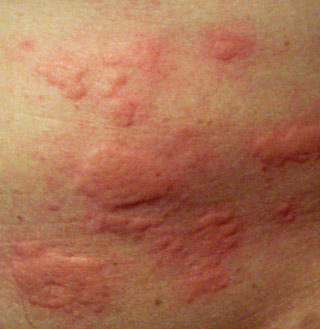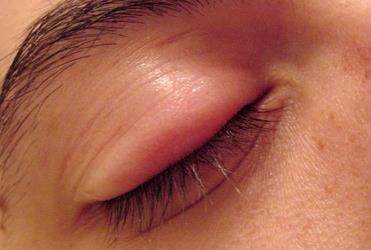If you develop rash all over body and swollen eyes, this could mean one of many things. Your first instinct may tell you that you are having an allergic reaction, and while they may be the case, it could possibly be something else going on. This article will give you some of the more common causes of this happening, and a few not so common causes. You will also learn when you should contact your doctor, and a few helpful home remedies you can try with your doctor’s okay. Read further to see what might be causing this to happen.


Possible Causes of Swollen Eyes and Rash All Over Body
It can happen suddenly after eating, or it may manifest over a few days’ time. Whatever the cause, a rash all over your body and eye swelling can be alarming.
1. Seasonal Allergies/Hay Fever
Seasonal allergies to environmental substances can make your eyes swell. External allergens can also cause you to develop a rash on your body. Things like tree pollen, grasses, blooming flowers, and nut harvesting can cause your body to react this way. You may notice this happening most often in the spring and fall seasons, but can happen any time of year depending on what you’re allergic to.
Other Symptoms: Coughing, runny/stuffy nose, sore throat, low-grade fever, and headaches.
2. Lyme/Erythema Migrans
Lyme disease is caused by tick bites, and is a bacterial infection. Some ticks carry bacteria in their saliva. When they bite, they feed on the blood supply of the host and can transmit the bacteria into your bloodstream causing the infection. It starts as a “bullseye rash” at the site of the bite. The infection can cause swollen eyes and rash all over body within the first few days. This condition needs medical evaluation and treatment as early as possible to prevent complications like chronic Lyme, severe joint pain, brain swelling, and even death.
Other Symptoms: Fever, headache, nausea, stiff neck, joint swelling and pain, delirium, and profound fatigue.
3. Poison Ivy
Going for a hike in the woods can be a fun and relaxing pastime. If you allow certain plants to brush your face, the toxins in the leaves may cause a skin reaction. This can make your eyes or even your entire face swell. Poison Ivy, poison oak, and poison sumac can all cause skin rashes, inflammation of the skin, and swelling where contact occurred. Scratching the site of contact and not washing the hands can spread the toxin to other areas of the body, causing the rash to spread.
Other Symptoms: Severe itching, blisters, redness in the contact area, watering eyes, swelling to the entire face, and pain.
4. Thyroid Disease
Too much or too little thyroid hormone can cause swollen eyes. Thyroid hormone imbalances can also cause dry irritated skin that may appear as a rash all over the body. Thyroid hormone regulates the metabolism, temperature, and heart for your body. If these levels are too high, your metabolism operates too fast. If the levels are too low, your body will slow down too much. Many people complain of eye, skin, and hair issues early on in thyroid disease.
Other Symptoms: Bowel habit changes, changes in appetite, feeling too hot or too cold, fatigue, joint pain, and hair loss.
5. Chagas Disease
Chagas disease is an emerging illness that is normally found in South American countries, but cases are increasing in the Southern United States. It is caused by a bite from the “kissing bug,” which transmits a parasite known as, Trypanosoma cruzi. The infection can cause swollen eyes and rash all over body. In some cases, the infection is mild and goes away with treatment. In cases left untreated, the infection can cause complications with the heart and be fatal.
Other Symptoms: Fever, fatigue, body pain, headaches, gland swelling, appetite loss, and swelling where the bite occurred. In later stages of the infection, heart related symptoms can occur including abnormal heart rate, chest pain, fluid around the heart, and trouble swallowing.
6. Chicken Pox
Chickenpox is a herpes virus that causes a rash all over the body and can lead to eye swelling. It begins with blisters on the trunk that can spread. If blisters spread to the eye area, eye swelling may occur. This is a common childhood disease that occurs in children age 2 and older, but there is a vaccine that is helping reduce cases.
Other Symptoms: Fatigue, fever, achiness, headache, appetite loss, and severe itching.
7. Allergic Reaction/Eyes
An allergic reaction to something may cause eye swelling, in addition to a rash all over the body. This is usually due to something you eat, or take internally (medications). It may also be caused by external exposure to something you are allergic to like soaps, perfumes, dye or lotions. The rash usually appears first, then swelling to the eyes, lips, or entire face will happen. If left untreated, it can be fatal. This is a medical emergency and needs immediate treatment.
Other Symptoms: Anxiety, feeling hot, itching, dizziness, trouble breathing/wheezing, nausea, diarrhea, and loss of consciousness (if severe).
When to See a Doctor
For any of the above conditions, you should seek emergency medical attention if the swelling includes your airways. Eye swelling in itself is not an emergency, but whatever caused your eyes to swell may affect other areas. If you are not having any trouble breathing, or an irregular heart rate, give your doctor a call as soon as possible.
Treatments to Help
You can do some things at home to help relieve swollen eyes and rash all over body, if you are not experiencing a life threatening condition. Home remedies may help relieve discomfort including:
- Cold cloth over eyes. Try placing a cool cloth over your eyes to help bring swelling down. You can also try an ice pack; just make sure it is wrapped in a towel to prevent cold burns.
- Poison oak creams. There are over-the-counter creams that help to relieve the symptoms of poison oak or ivy exposure. While these cannot be used in the eye area, they will help relieve skin rashes and inflammation.
- Vaccinations. Chickenpox is a preventable illness with proper vaccinations. This vaccine is usually given in two doses starting at one-year of age.
- Manage seasonal allergies. Proper management of seasonal allergies can help relieve symptoms. This includes:
- Close windows at night to reduce pollen in the house.
- Use an over-the-counter antihistamine.
- Drink plenty of fluids.
- Shower and change clothes after being outside for long periods.
- Try over-the-counter antihistamine eye drops.